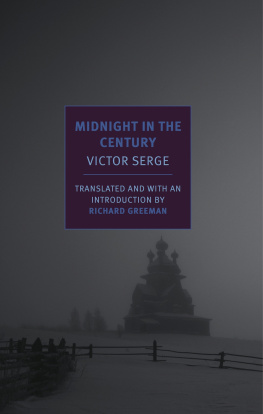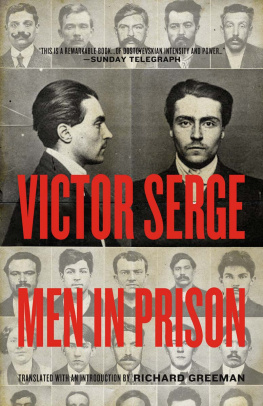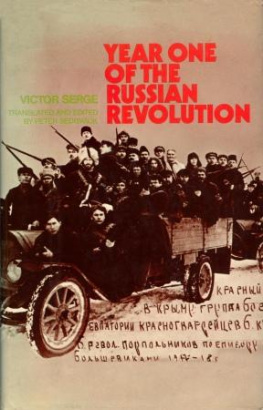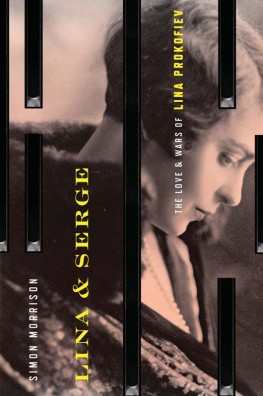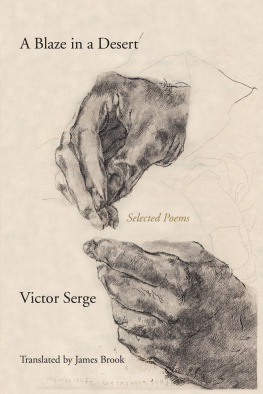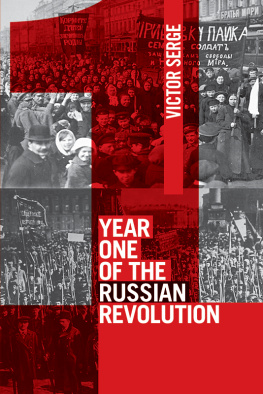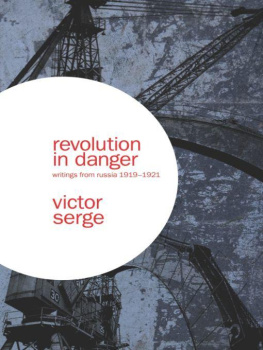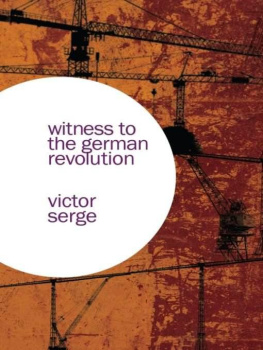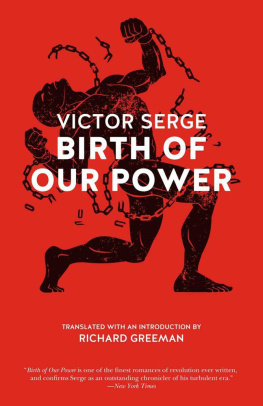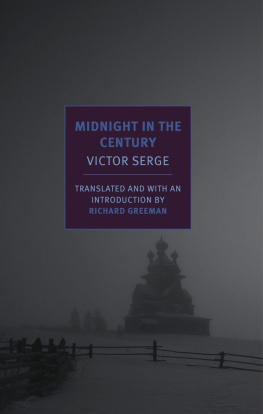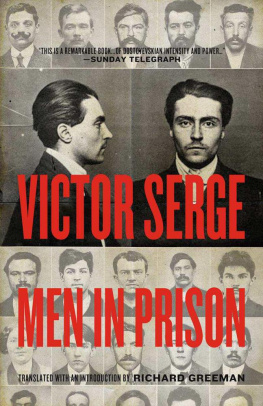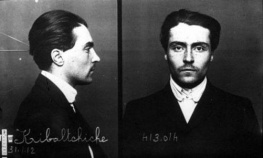
VICTOR SERGE (18901947) was born Victor Lvovich Kibalchich to Russian anti-tsarist exiles, impoverished intellectuals living by chance in Brussels. A precocious anarchist firebrand, young Victor was sentenced to five years in a French penitentiary in 1912. Expelled to Spain in 1917, he participated in an anarcho-syndicalist uprising before leaving to join the Revolution in Russia. Detained for more than a year in a French concentration camp, Serge arrived in St. Petersburg early in 1919 and joined the Bolsheviks, serving in the press services of the Communist International. An outspoken critic of Stalin, Serge was expelled from the Party and briefly arrested in 1928. Henceforth an unperson, he completed three novels (Men in Prison, Birth of Our Power, and Conquered City) and a history (Year One of the Russian Revolution), all published in Paris. Arrested again in Russia and deported to Central Asia in 1933, he was allowed to leave the USSR in 1936 after international protests by militants and prominent writers like Andr Gide and Romain Rolland. Using his insiders knowledge, Serge published a stream of impassioned, documented exposs of Stalins Moscow show trials and machinations in Spain, which went largely unheeded. Stateless, penniless, hounded by Stalinist agents, Serge lived in precarious exile in Brussels, Paris, Vichy France, and Mexico City, where he died in 1947. His classic Memoirs of a Revolutionary and his great last novels, Unforgiving Years and The Case of Comrade Tulayev (both available as NYRB Classics), were written for the desk drawer and published posthumously.
RICHARD GREEMAN has translated and written the introductions for five of Serges novels (including Unforgiving Years and Conquered City, both available as NYRB Classics). A veteran socialist and co-founder of the Praxis Center and Victor Serge Library in Moscow, (www.praxiscenter.ru), Greeman is the author of the Web site The Invisible International (bit.ly/invisible-international).
OTHER BOOKS BY VICTOR SERGE PUBLISHED BY NYRB CLASSICS
The Case of Comrade Tulayev
Conquered City
Memoirs of a Revolutionary
Unforgiving Years
MIDNIGHT IN THE CENTURY
VICTOR SERGE
Translated from the French and with an introduction by
RICHARD GREEMAN
NEW YORK REVIEW BOOKS

New York
THIS IS A NEW YORK REVIEW BOOK
PUBLISHED BY THE NEW YORK REVIEW OF BOOKS
435 Hudson Street, New York, NY 10014
www.nyrb.com
Copyright 1939 by ditions Grasset & Fasquelle
Translation copyright 1981 by Richard Greeman
Introduction copyright 2015 by Richard Greeman
Illustrations copyright 1981 by VLADY
All rights reserved.
Originally published in French as Sil est minuit dans le sicle by ditions Bernard Grasset, Paris, 1939
Portions of the introduction by Richard Greeman were published in Messages: Victor Serge and the Persistence of the Socialist Ideal, Massachusetts Review XXII, no. 3 (Autumn 1981).
Cover photograph: Richard Davies, Podporozhye, Arkhangel Region, Church of St. Vladimir (1757); courtesy of the photographer
Cover design: Katy Homans
Library of Congress Cataloging-in-Publication Data
Serge, Victor, 18901947.
[Sil est minuit dans le sicle. English]
Midnight in the century / Victor Serge ; translated by Richard Greeman.
1 online resource. (New York Review Books classics)
ISBN 978-1-59017-796-9 ISBN 978-1-59017-770-9 (paperback)
1. Soviet UnionHistoryRevolution, 19171921Fiction. I. Greeman, Richard. II. title.
PQ 2637. E 49
843'.912dc23
2014014590
ISBN 978-1-59017-796-9
v1.0
For a complete list of books in the NYRB Classics series, visit www.nyrb.com or write to: Catalog Requests, NYRB, 435 Hudson Street, New York, NY 10014.
CONTENTS
INTRODUCTION
I. WRITER AND REVOLUTIONARY
Victor Serges Midnight in the Century is an authentic document grounded in the authors personal experience of arrest, interrogation, and deportation by the GPU to Orenburg on the Ural from 1933 to 1936. Soon after the novels publication in Paris in 1939, however, Serge took pains to insist that although entirely truthful (in political and historical terms) his novel was a work of the imagination. Indeed, as a writer who placed himself in the line of the Russian novelists, Serge claimed for fiction a truth superior to that of history or the essay combining internal vision with the knowledge of men and things. He insisted that to reconstruct reality with sufficient intensity of life requires literary creation and the intuition, passion and freedom it provides.
The paradox of Serge the literary artist was that he was also a committed revolutionary. Always in the thick of action, his career united the roles of propagandist, organizer, journalist, pamphleteer, lecturer, theoretician, publicist, translator, militiaman, manual worker, occasional secret agent, and frequent prisoner (for more than ten years and under at least three different regimes). Serge was both an activist and an independent critical thinker whose political involvements evolved from anarchism through syndicalism, Bolshevism, and Trotskyism to a kind of socialist humanism. The child of anti-tsarist exiles, he came of age in a tradition of socialist culture which came to flower in figures like Lenin, Trotsky, Zinoviev, Bukharin, Stalin, Radek, Andrs Nin, Emma Goldman, Georg Lukcs, and Antonio Gramscito mention only those with whom Serge was personally acquainted.
Of all the left-wing writers who attempted, from the inside, to depict the truth of the Communist movement during the tragic decades of Stalins ascendancynames like Orwell, Koestler, Regler, Malraux, and Silone come most readily to mindSerge was perhaps the most authentic socialist, indeed the only professional revolutionary. A veteran, eventually lonely survivor, of revolutionary movements in half a dozen countries, witness-participant to several of the major victories and defeats of the revolutionary proletariat in the first half of the twentieth century, his knowledge of men and things was unequaledas was his devotion to the truth.
Yet it is above all as a literary witness and ultimately as an artist that Serge will be rememberedan artist speaking directly out of a vital socialist culture whose traditions and aspirations, successes and failures he distilled and preserved in his writing. As Erich Fromm wrote to me in 1964, I believe indeed that to rescue the humanist tradition of the last decades is of the utmost importance, and that Victor Serge is one of the outstanding personalities representing the socialist aspect of humanism.
But it was in his novels (of which seven survive) that he best succeeded in re-creating the psychological, intellectual, and physical atmosphere (and above all the human dimension) of the tragic and heroic struggles in which he was so deeply involved. Serge conceived of writing as an act of witness, as a means of expressing for people what most of them live without being able to express, as a means of communion, as a testimony about the vast life that flows through us whose essential aspects we must try to fix for the benefit of those who will come after us. The values that inform his work are those of sincerity, solidarity, and truthfulness.
Paradoxically, Serge turned to literature at the very moment when Russian writers were being forced to deny these values. By 1930, the freedom and creative ferment of the Soviet literary renaissance of the 1920s, in which Serge had taken part as a critic and translator, had been crushed by the Stalinist bureaucracy. Serge, however, although a Soviet citizen, wrote in French and published mainly in Paris. This circumstance allowed him to continue the literary experiments of his Russian friends and colleaguesBabel, Esenin, Gladkov, Mandelstam, Mayakovsky, and Pilniak, among otherswhose voices were silenced by censorship, suicide, and deportation. His work thus represents a unique strand of continuity in Russian writing between the creative flowering of the 1920s and the post-Thaw dissidence in that it escapes the straightjacket of Stalinist socialist realism.

